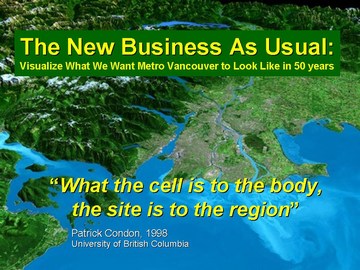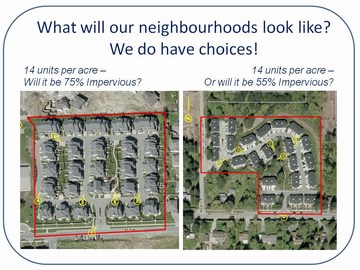Metro Vancouver Board Aligns Regional Planning Vision with “Living Water Smart, BC’s Water Plan”
Note to Reader:
To download a PDF version of the following web story, click on Metro Vancouver Board Aligns Regional Planning Vision with “Living Water Smart, BC’s Water Plan”

Sustainability Context
The Metro Vancouver regional district is moving forward with Phase 2 consultation for an updated Liquid Waste Management Plan (LWMP). This regulatory document provides the framework and direction for regional sewage treatment and municipal rainwater management.
The LWMP is a core component of the Metro Vancouver Sustainability Framework; and implementation of the strategies and actions in the Plan will shape how the region achieves community well-being and environmental integrity over time.
Doing Business Differently
In a February 2009 report to the Metro Vancouver Waste Management Committee, Fred Nenninger (Division Manager, Policy and Planning Department) wrote that “new information and drivers suggest that further modifications to the draft LWMP would greatly enhance the consultation process and better articulate the alignment of the Plan with provincial plans and direction.”
One of these drivers is Living Water Smart, BC’s Water Plan. Released in June 2008, this visionary document encourages local governments to do business differently, prepare communities for change, and choose to be water smart.

Aligning with Provincial Initiatives
 According to Lois Jackson, Chair, when the Greater Vancouver Sewerage & Drainage District Board met in March 2009, “it approved realigning the goals, strategies and actions in the updated LWMP to keep current with senior government policies and positions, as well as ensure that Metro Vancouver’s and senior governments’ environmental and fiscal objectives and actions are mutually supportive and successful.”
According to Lois Jackson, Chair, when the Greater Vancouver Sewerage & Drainage District Board met in March 2009, “it approved realigning the goals, strategies and actions in the updated LWMP to keep current with senior government policies and positions, as well as ensure that Metro Vancouver’s and senior governments’ environmental and fiscal objectives and actions are mutually supportive and successful.”
To Learn More:
For the complete story on how Metro Vancouver is proceeding, download a copy of Aligning with Provincial Initiatives.
Living Water Smart in Metro Vancouver
“The LWMP supports provincial government positions in many areas. Local watershed planning is supported and enhanced through completion and implementation of municipal Integrated Stormwater Management Plans required by the LWMP,” continues Fred Nenninger.
“The provincial position to mandate purple pipes in new construction by 2010 will lead to a new network that delivers alternative water resources for non-drinking water uses—this will conserve drinking water and valuable distribution capacity. The LWMP helps to set-up alternate water supplies through its rainwater harvesting and water reclamation actions.”
“Other Living Water Smart objectives supported by the LWMP include: developing an understanding of what makes streams healthy; watershed management planning in priority areas; and helping address the impacts of climate change and climatic cycles on local water resources. This is supported by the ongoing work of Metro Vancouver’s two inter-governmental LWMP committees, the Environmental Monitoring Committee and Stormwater Inter-agency Liaison Group.”

Looking Ahead
 “A key message in Living Water Smart is that green development makes sense,” states Lynn Kriwoken Director, Innovation and Planning in the Water Stewardship Division of the Ministry of Environment, and the Province’s lead person for delivery of Living Water Smart.
“A key message in Living Water Smart is that green development makes sense,” states Lynn Kriwoken Director, Innovation and Planning in the Water Stewardship Division of the Ministry of Environment, and the Province’s lead person for delivery of Living Water Smart.
“New thinking about development leads to new benefits. These include more green spaces, more water and fish in the streams, improved community vitality, reduced demand for water, and reduced expenditure on infrastructure.”
Reference Panel Perspective
In April 2008, Metro Vancouver appointed a 9-person Reference Panel to provide comments and advice on the strategies and actions in the LWMP. The Reference Panel reports to the Board through the Waste Management Committee, chaired by Councillor Marvin Hunt (City of Surrey).
 “In July 2008, the Reference Panel recommended that Metro Vancouver change the name of the plan to Liquid RESOURCE Management Plan,” states Kim Stephens, Reference Panel chair (and Program Coordinator, Water Sustainability Action Plan for British Columbia).
“In July 2008, the Reference Panel recommended that Metro Vancouver change the name of the plan to Liquid RESOURCE Management Plan,” states Kim Stephens, Reference Panel chair (and Program Coordinator, Water Sustainability Action Plan for British Columbia).
“The Board listened and has asked the Province to make the necessary administrative amendments that will enable the name change. The Reference Panel also brought to Metro Vancouver’s attention the importance of aligning the LWMP with Living Water Smart. We are pleased that the Board has again listened, and is leading by example in embracing the Living Water Smart vision.”
“We urged Metro Vancouver to change the name to Liquid RESOURCE Management Plan because it was a tangible way to start the paradigm-shift that will result in doing business differently,” adds Christianne Wilhelmson, Reference Panel co-chair (and Managing Director, Georgia Strait Alliance). “When we reported out to the elected representatives in July 2008, we challenged Metro Vancouver to provide visionary leadership, focussing on protecting the marine environment and recovering resources from our wastes.”

Establishing Expectations
“The LWMP is a powerful regulatory tool that has the potential to truly effect change for the better on the ground,” continues Kim Stephens. “While the LWMP spotlight has been on sewage treatment because of the $1.4 billion price tag, the LWMP also creates the opportunity to integrate land-use and transportation planning with municipal RAINwater / stormwater management services and green infrastructure to more effectively and affordably protect urban stream health.”
“By changing the name to Liquid RESOURCE Management Plan, and aligning it with Living Water Smart, this opens the door to encouraging ‘green choices’ that will ripple through time and will be cumulative in creating liveable communities and protecting stream health.”
“Aligning the Plan with Living Water Smart sets the stage for establishing consistent expectations for green choices and green infrastructure: This is what we want to achieve, and this how we will get there. We are NOT saying that every community must follow the same formula; what we are saying is that everyone needs to agree on expectations and how all the players….regulators, developers, designers, etc…will work together, and after that each community can reach its goals in its own way.”

Regional Team Approach
On March 12, the City of Surrey hosted a forum that promoted alignment of local actions in Metro Vancouver with provincial goals as stated in Living Water Smart, BC’s Water Plan. The following challenge statement provided a frame-of-reference for advancing a consistent ‘regional team approach’ in Metro Vancouver:
- How do we simultaneously work together as staff within a municipality and as a region AND externally with developers and other private sector players, to ensure we implement sustainable approaches to development?

Today’s Expectations are Tomorrow’s Standards
The objective was to start a dialogue between policy-makers and project implementers around the HOW question as it pertains to green infrastructure:
- HOW will the City of Surrey get it built right;
- HOW will a consistent regional approach be achieved in Metro Vancouver?
The Forum was co-sponsored by the Water Balance Model Inter-Governmental Partnership and the Green Infrastructure Partnership, with a goal of moving beyond pilot projects to a watershed-based approach to achieving performance targets for rainwater management and green infrastructure.

Joint Statement by the City of Surrey, the Inter-Governmental Partnership and Green Infrastructure Partnership:
“To get to the big picture, it starts with the smallest pieces. For this reason, the Surrey Forum is advancing a regional team approach that aligns local actions with provincial policy goals as articulated in the Living Water Smart and the Green Communities initiatives. Making this happen requires partnerships, collaboration, innovation and integration.
We see the Forum as providing an opportunity to generate positive energy in the region. In particular, the Forum will inform the actions identified in the rainwater/stormwater component of Metro Vancouver’s updated Liquid Waste Management Plan. We believe this is where the opportunity for implementing a regional team approach resides.
We anticipate that the Forum sharing sessions will show that there are solutions if people talk to each other about what they each could do differently. This will help all parties collaborate to more effectively fulfil their piece of the sustainable development puzzle.
Once we know what we want our watersheds and neighbourhoods to look like, the next step is to decide what the tools are that will get us there. All of us ….whether we are regulators, developers or designers ….need to understand and care about the goal if we are to create the future that we all want.”

